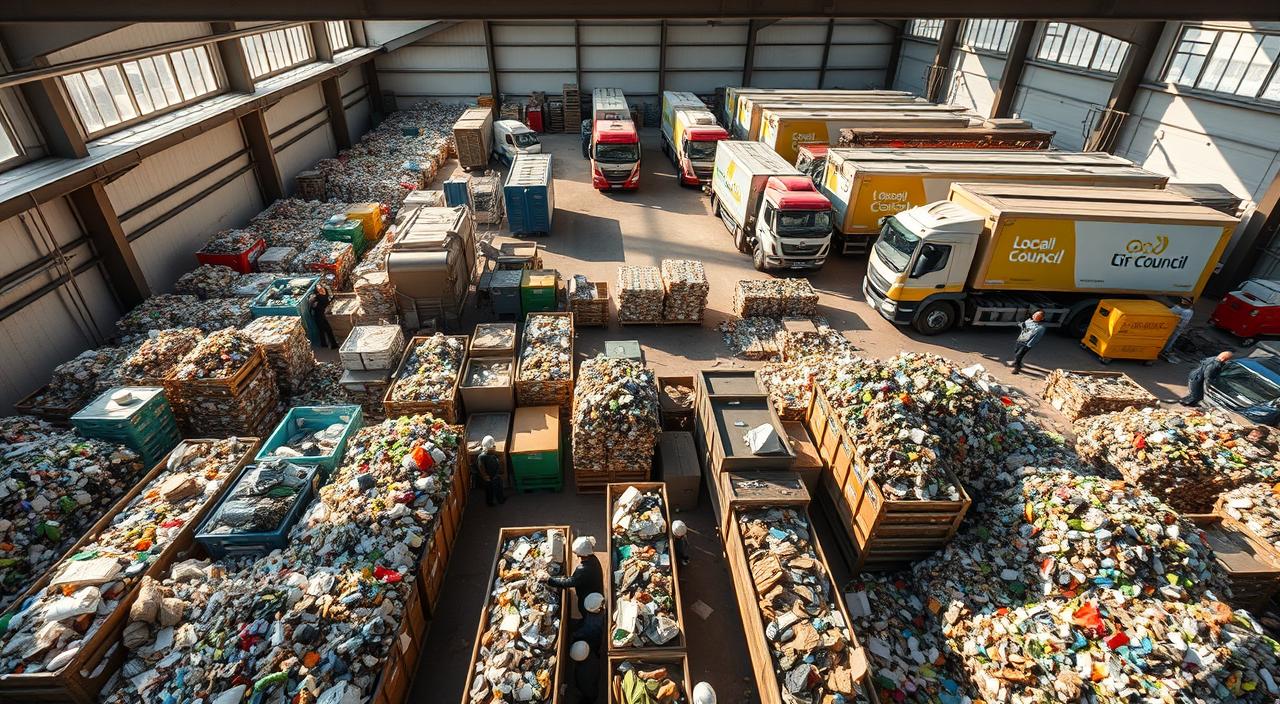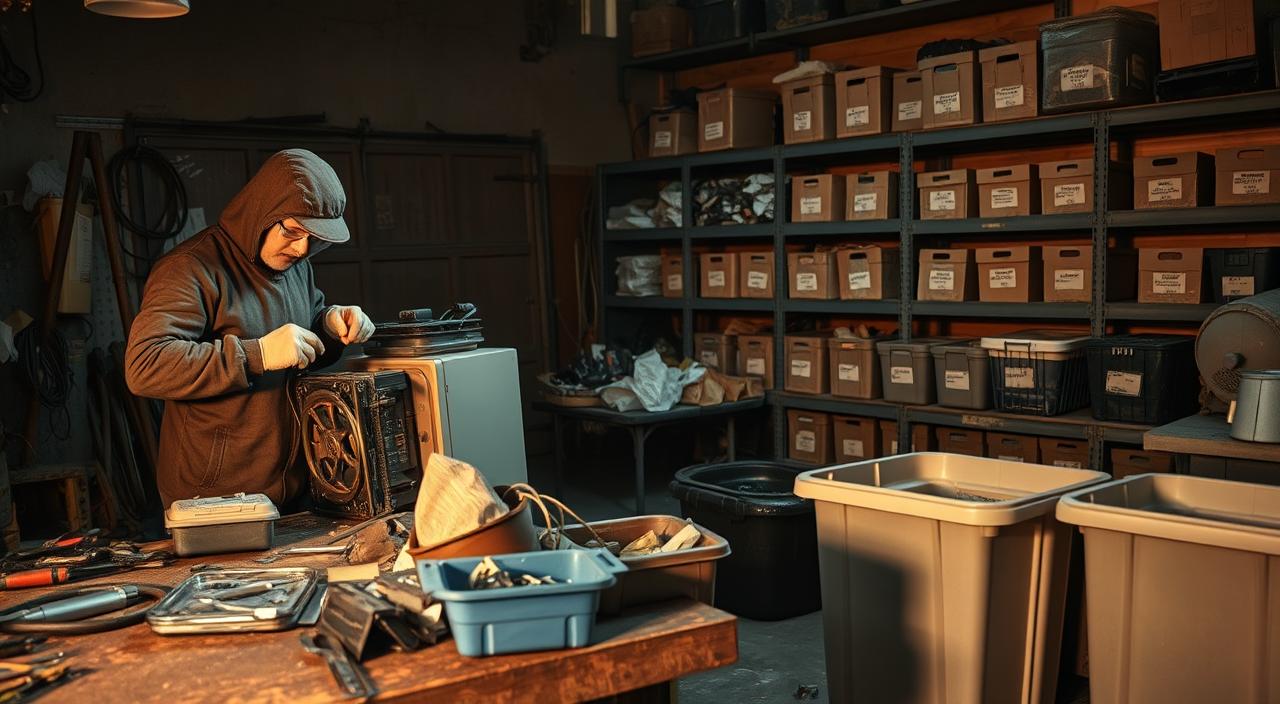Ever wonder where your rubbish goes once the council collection truck pulls away? The journey of household waste in the UK is far more complex—and crucial—than most realise. From food scraps and broken electronics to garden clippings and unwanted furniture, waste is sorted, processed, and either repurposed, recycled, or safely disposed of.

Understanding how the system works not only helps you stay compliant with UK laws, but also contributes directly to reducing landfill waste and supporting sustainability goals.
Key Takeaways
- UK councils provide colour-coded bins for separating waste types.
- Special items like electricals and upholstered furniture need licensed disposal.
- Using unauthorised collectors can lead to legal and environmental risks.
- Recycling centres turn discarded materials into reusable resources.
- Planning disposal during renovations helps avoid fines and waste mismanagement.
What Counts as Household Waste in the UK?
“Household waste” covers much more than what’s in your kitchen bin. It includes:
- Garden trimmings and grass clippings
- Old or broken furniture and mattresses
- DIY waste like bricks, tiles, timber, and plasterboard
- Unwanted textiles, toys, and small appliances
- Hazardous materials (paints, batteries, solvents, etc.)
🔗 Learn more about types of domestic waste and how to prepare for flat clearance in London.
Some items require extra care. For example, batteries and engine oil cannot be disposed of in regular bins due to fire and contamination risks. Always refer to your council’s waste policy for detailed guidance.
Legal Responsibilities: Don’t Risk a Fine
Disposing of rubbish the wrong way can lead to serious consequences. Here’s what you need to know:
| Offence | Fine (Up To) |
|---|---|
| Using an unlicensed waste carrier | £400 |
| Fly-tipping or illegal dumping | Unlimited (Court-decided) |
Before hiring a private waste removal service, always:
- Check they are registered on the Environment Agency’s public register.
- Request a copy of their waste carrier licence.
- Get a written receipt or transfer note for proof.
If you’re hiring builders or decorators, ensure they take responsibility for the debris they generate. Mixing trade waste with residential rubbish breaches council regulations.
How UK Waste Disposal & Recycling Works

Waste collection in the UK is a collaboration between local councils and licensed private operators. Together, they manage everything from weekly rubbish pickups to large-scale renovation waste.
Council Waste Collection
Most local authorities offer:
- Weekly or fortnightly bin collections
- Colour-coded bins (e.g., green for general waste, blue for recycling, brown for garden waste)
- Optional food waste caddies
- Bulky waste collection services (booking required)
Visit your council’s website to access their digital waste collection calendar and policies. For instance, the Hazel Court HWRC in York provides services for everything from small electronics to DIY debris.
When to Use Private Services
For items councils won’t collect—like large quantities of plasterboard or full-home clearances—private companies step in.
- Same-day rubbish removals
- Clearance of entire properties
- Sofa and furniture disposal
Many retailers also offer take-back schemes for electronics when you buy replacements. Charity shops and repair cafés extend the lifespan of reusable items and reduce the pressure on waste systems.
🔗 See also: Recycle Your Electricals – a UK-wide take-back program.
Navigating Your Council’s Services
Knowing how and when your bins will be collected is essential for effective waste management.
Digital Waste Calendars
Most councils provide downloadable collection calendars with:
- Colour-coded dates
- Seasonal reminders (e.g., Christmas tree pickups)
- Bank holiday service adjustments
York residents, for example, can download 12-month collection plans, updated for weather disruptions or staff shortages.
Visiting Recycling Centres
If your item is too large or hazardous for curbside pickup, locate your nearest household waste recycling centre (HWRC) using your council’s postcode tool.
| Commonly Accepted Items | Restrictions |
|---|---|
| Electronics, garden waste, timber | Proof of residency required |
| Paints, oils, and solvents | Designated hazardous waste days only |
Staff at these centres can help sort your materials correctly. Separate items before arrival to save time and reduce contamination risks.
Special Waste Types: DIY, Furniture & Upholstered Items

DIY and Renovation Waste
DIY waste (e.g. tiles, timber, toilets) is classed as “non-household,” meaning it often incurs limits or charges. Different councils have different rules, but here’s a general guide:
| Vehicle Type | Free Visits | Time Frame | Permit Required |
|---|---|---|---|
| Small cars | 8 | 60 days | No |
| Vans & trailers | 6 | Yearly | Yes (E-permit) |
Some items (like plasterboard) require specific disposal due to dust risks and contamination potential.
Upholstered Furniture
Items like sofas and armchairs now contain fire-retardant materials and may be treated as hazardous waste.
Before visiting a recycling centre:
- Do not dismantle the furniture
- Wrap torn or damaged sections in plastic
- Tape any exposed foam or stuffing
Your local HWRC may have a designated bay for upholstered seating—check before you go.
Sustainability in Action: The Bigger Picture
Proper waste management is more than just routine—it’s a contribution to a sustainable future. Materials collected through recycling often become:
- Recycled paper, metal, or plastic products
- Compost or biomass for energy production
- Building materials like recycled aggregate
Poor sorting, illegal dumping, or using unlicensed collectors undermines this system and harms both the environment and public health.
Conclusion
Your household waste has a life far beyond the bin. Each item you discard enters a well-structured system of collection, sorting, and potential reuse. By understanding how UK waste services work—from bin schedules to recycling centre rules—you take an active role in protecting your community and the planet.
Being informed isn’t just about compliance; it’s a step toward sustainability. Whether you’re clearing a house, managing renovation leftovers, or simply tidying up your shed, your choices ripple through the system. Use licensed collectors, sort waste properly, and take advantage of local resources.
Together, we can turn everyday waste into long-term benefit.